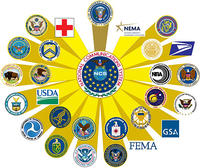-
Army engineers need $1 billion to repair damaged levees
The U.S. Army Corps of Engineers is urgently requesting $1 billion to repair flood control systems along the Mississippi and Missouri river basins following damage from record floods this spring; the historic flooding forced the corps to blow up portions of the levee to relieve pressure, flooding thousands of acres of farmland to protect cities along the rivers
-
-
DHS completes Multi-Band Radio testing

Last week DHS completed testing on a sophisticated new multi-band radio that will allow first responders to communicate with multiple agencies and jurisdictions operating on different radio bands; beginning in May 2012, first responders will have the opportunity to purchase the Harris XG-100 Unity radio system; the Unity radios can replace up to five different radios, roughly the equivalent cost of just one high-end portable radio
-
-
FEMA chief: agency to recover $1 billion for disaster relief fund
Testifying before the House Homeland Security Subcommittee last week, Federal Emergency Management Agency (FEMA) administrator Craig Fugate said the agency expects to recover about $1 billion from its disaster relief projects this fiscal year
-
-
Bangkok's losing battle against floods
The Thailand government has been taking desperate measure to try and prevent a massive flow of water from inundating the Thai capital — parts of which are already under water. The swelling Chao Phraya river, which meanders through the heart of the sprawling city, has already flooded several neighborhoods, while swelling water from the Gulf of Thailand poses another threat. One reason for Bangkok’s growing flood problem is the fact that over the last two decades, many draining canals have been paved over to make room for roads, leaving rising water with no way to escape.
-
-
Israel's aid to Turkey "humanitarian, not political"
Israel was among the first countries to rush plane-loads of disaster and search and rescue equipment to Turkey after last Sunday’s devastated earthquake which has killed more than 550 and displaced thousands. Both sides insist that the disaster relief was a humanitarian gesture which will have no effect on the deteriorating relations between these two former allies.
-
-
Four tremors hit Bay Area
Thursday saw the fourth tremor in as many days to hit California’s Bay Area. The 3.6 quake hit the Berkeley area at 5:30am. Unsettling as the quakes were, geologists have even more disturbing news for Bay Area residents: they say the quakes were much too small to relieve the seismic pressures that have been building along the Hayward Fault since the last Big One hit the area in 1868. Studies show that the Big Ones hit the area at regular intervals of about 160 years — meaning another Big One is coming.
-
-
Also noted
Fukushima nuke pollution in sea ‘was world’s worst’ | Study: Japan nuclear radiation higher than estimated |FDA readies food transportation safety regulation | Report: China suspect in satellite interference by U.S.| Nuclear Power Safety Experts to Convene in Washington, D.C.| Texas Adds New Cameras To Border Security | Ottawa is hosting a major conference on non-lethal weapons technology
-
-
States over reliant on FEMA aid for small disasters
This year’s unprecedented number of major natural disasters including Hurricane Irene, the record number of tornadoes, and the floods along the entire Mississippi and Missouri rivers strained the Federal Emergency Management’s (FEMA) coffers, but the number of relatively minor disasters that were declared as “major disasters” pushed FEMA resources beyond their limit; some critics say this trend needs to stop
-
-
Turkish PM criticizes builders for unsafe practices
Sunday’s 7.2 tremor in Turkey killed at least 460 people, injured 1,350, destroyed more than 2,000 buildings, and displaced thousands; Turkish prime minister harshly criticizes Turkish builders, saying negligence amounts to murder
-
-
USAID, Swiss Re Partnership Targets Hunger, Natural Disasters
USAID and Swiss Re a few days ago announced a 3-year partnership to help vulnerable communities fight hunger, build resilience to climate change, and reduce the costs of natural disasters in the Americas, Africa, and Asia
-
-
Also noted
Integrated Emergency Response essential to Effective Disaster Management | How Steve Jobs helped emergency management | Assessment of Thailand Flooding Impact Updated | NY team assesses Prattsville disaster recovery | SBA approves more than $55 million disaster loans in New Jersey
-
-
Illinois distributes $3.4 million to help first responders upgrade radios

Earlier this week the Illinois Terrorism Task Force (ITTF) announced that it was awarding more than $3.4 million to 156 local emergency response agencies across the state to upgrade their communications equipment; the funds come from DHS grants designed to help states comply with new federal communications requirements aimed at relieving congestion and increasing channels on non-narrowband radios
-
-
Decontaminating Japan to cost at least $13 billion
Last week Japanese Prime Minister Yoshihiko Noda announced the government will spend at least 1 trillion yen, or $13 billion, to decontaminate areas affected by nuclear radiation from the Fukushima Daiichi atomic power plant
-
-
LA-area hospitals prepare for the big quake
In earthquake-prone California, local hospitals and emergency responders are at hard at work preparing for the next big quake
-
-
DC officials receive priority disaster phone access

During major disasters or a terrorist attack, phone lines quickly become inundated with traffic which makes it nearly impossible for residents to make calls or send texts; to ensure that local officials have the ability to communicate during disasters, DHS recently issued special calling cards to members of the Washington, D.C. City Council that allow their calls to take priority during moments of heavy phone traffic
-
More headlines
The long view
Trump Aims to Shut Down State Climate Policies
President Donald Trump has launched an all-out legal attack on states’ authority to set climate change policy. Climate-focused state leaders say his administration has no legal basis to unravel their efforts.
